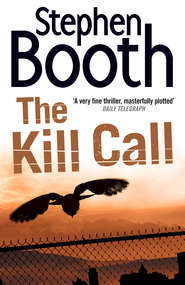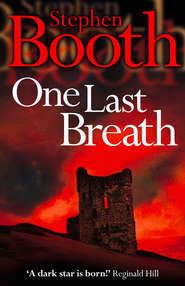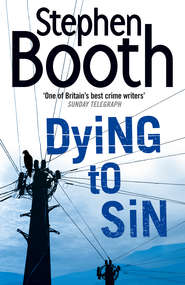По всем вопросам обращайтесь на: info@litportal.ru
(©) 2003-2024.
✖
Scared to Live
Автор
Год написания книги
2019
Настройки чтения
Размер шрифта
Высота строк
Поля
‘There’s more. Read the rest of it.’
‘No. This is ridiculous.’
‘I’ll print it out for you. You can read it later.’
‘I don’t want to read it later, thanks. I can’t understand why you’re doing this, Matt. What’s the point?’
‘What’s the point? It says that members of families vulnerable to schizophrenia can carry the genes for it, while not being schizophrenic themselves. They’re called “Presumed Obligate Carriers”.’
‘Matt, you don’t know anything about this stuff.’
‘I’m trying to find out. Look, there’s a bit of research here that talks about anticipation.’
‘What?’
‘The progress of an illness across several generations. They studied families affected by schizophrenia and found that, in each generation, more family members were hospitalized with the condition at an earlier age, and with increasing severity.’
‘And your conclusion, Doctor …?’
Matt pressed a couple of keys, and the laser printer whirred into life. He turned to face his brother.
‘My conclusion is, I reckon my kids could be eight times more likely than average to have schizophrenia.’
Ben shook his head. ‘It’s still a small chance, Matt. We were told that one in every hundred people suffers from schizophrenia. So even taking heredity into account, that’s only a maximum risk of, what … eight per cent?’
‘It’s a bit less than our risk, admittedly.’
‘Ours?’
‘Yours and mine, little brother. The children or siblings of schizophrenics can have as high as a thirteen per cent chance of developing the disease.’
Matt took a couple of sheets off the printer, stapled them together and held them out to his brother. Ben didn’t take them.
‘You actually believe all this stuff?’
‘Look at it, won’t you?’
But Ben shook his head and sat back down on the arm of the chair. Meg groaned and looked up at him accusingly with one tired eye. She was a dog who liked peace. Raising your voice in her sleeping area just wasn’t on.
Matt held up the pages again. ‘They think some families might lack a genetic code that counteracts the disease. You know, I’m wondering now if Grandma had schizophrenic tendencies. She had some strange habits – do you remember? But everyone in the family used to talk about her as if she was only a bit eccentric.’
‘I do remember her being rather odd, but that doesn’t mean a thing. It certainly doesn’t mean you’ll pass something on to the girls.’
‘You know, I’m trying to picture it,’ said Matt. ‘I can see myself, forever on the lookout for early-warning signs in Amy and Josie. It would be sensible, in a way – early intervention and treatment would result in the best prognosis. But what kind of effect would it have on the girls if we were watching all the time for telltale signs?’
Ben wasn’t sure who his brother was talking to now. He might as well be alone in the office with the dog.
‘Sometimes, I’m stopped cold by the thought that one of the girls could grow up to be like Mum. I might end up being afraid of my own child. At other times, I imagine what a relief it would be if my children turned out to have any other problem at all but schizophrenia. I feel as though I might be able to make some kind of deal with God.’
‘You don’t believe in God,’ said Ben.
‘No, I don’t. But it doesn’t stop me. It’s the idea of a bargain, playing with the percentages. I go over and over the figures in my head. Chances are, I say to myself, both the girls will be fine. And genes aren’t the only factor. Schizophrenia is only about seventy per cent inherited – which means thirty per cent is due to environmental factors, right?’
‘Yes.’
‘So if we knew what other factors could influence people … If we knew, we might be able to create a different environment, so the genetic switch wouldn’t be flipped.’
‘Matt, you’re making far too much of this. You said yourself most of what you find on the internet is rubbish.’
‘“Crap”, I said. A steaming pile of cow flop, if you like. But not this. You know this isn’t rubbish, Ben.’
‘You’re worrying about nothing. Your children are perfectly OK.’
Ben’s attention was caught by a movement outside. The window looked out on to the narrow front garden and the farmyard beyond. His youngest niece, Josie, was sitting on the dividing wall.
‘That’s what I’m worrying about,’ said Matt.
Ben tapped on the window so that Josie looked up, and he waved. She giggled, waved back, then blew him a kiss.
‘There is absolutely nothing wrong with Josie,’ he said. ‘Or Amy, for that matter.’
‘Do you remember before she started school, Josie had an imaginary friend? She used to say her friend was with her, and talked to her all the time.’
‘For God’s sake, every child has an imaginary friend at that age, Matt.’
‘I didn’t.’
‘That’s because you had no imagination.’
‘Thanks.’
Turning back to the window, Ben saw Josie poke her tongue out at him, perhaps because she’d lost his attention for a moment.
‘Does she still have that imaginary friend?’ he asked.
‘I don’t know,’ said Matt. ‘Josie doesn’t mention her any more, not since she started school. But that might be because she realized other people found it odd, so she stopped talking about it.’
‘Or it might be because she has real friends now and doesn’t need the imaginary one.’
‘Do you think so, Ben?’
‘With the best will in the world, it was a bit lonely up here for Josie when Amy was already at school and she wasn’t.’
‘Time will tell, I suppose,’ said Matt. ‘But I have to find out the facts. It was me who made the decision to have children. Well, me and Kate.’
‘Have you talked to Kate about it?’
Matt ran a hand across his face. ‘I need to know what to tell her first.’











